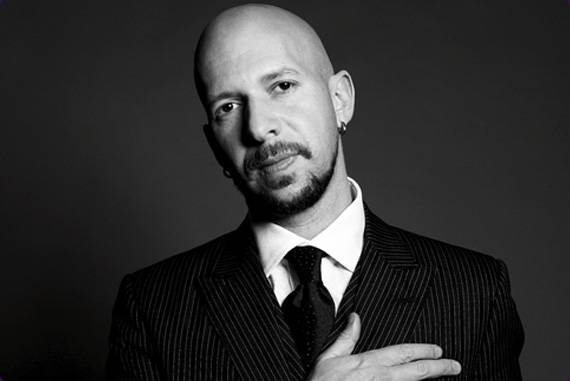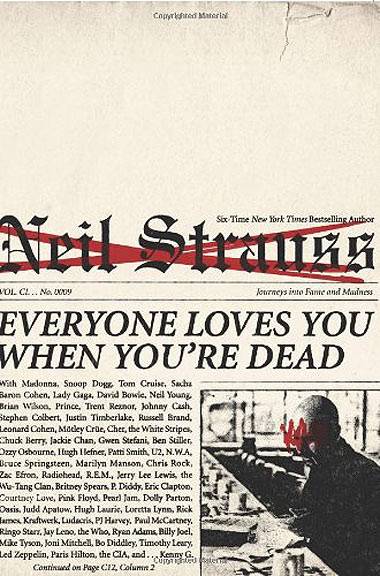Interview – Neil Strauss
– by Shawn Conner
Before Neil Strauss, Author of The Game, there was Neil Strauss, Rock Journalist.
Everyone Loves You When You’re Dead, the six-time New York Times bestselling author’s new, just-released book, is a collection of out-takes of many of his interviews over the years. In some ways it’s combination of greatest hits and uncollected B-sides: select moments, some seeing print for the first time, from dozens if not hundreds of conversations over the years.
The big names are here, from Led Zeppelin to Lady Gaga, but sometimes the subject has been forgotten, or never had a chance to be remembered. The mighty rub shoulders with the obscure, united in these pages more often than not by the common thread of what, in poker, is called “the tell” – the giveaway gesture or sign that someone is bluffing (or not). In this case, “the tell” is the unguarded moment, whether it’s Orlando Bloom fretting about critical reception to his new movie or Korn‘s Jonathan Davis wondering why everyone hates him.
We reached Strauss in New York City on a March Monday, the day before he was about to start a 1o-city book-signing tour, which includes a stop in Seattle next Tuesday (March 22). While in Manhattan, he was also scheduled to do some cross-promotion with someone who didn’t make it into Everyone Loves You When You’re Dead.
Neil Strauss: Sammy Hagar’s doing a book signing tomorrow. His book comes out the same day as mine and I told him I’d interview him live at his book-signing to promote both books.
Shawn Conner: Have you read his book?
NS: I’m reading it now.
SC: Did he have help?
NS: He had a writer, a San Francisco daily newspaper critic.
SC: You never made the list to help write it? [Strauss has also written several “with” books, including the tell-everything-the-lawyers-will-allow The Dirt (with Motley Crue), How to Make Love Like a Porn Star (with Jenna Jameson), Don’t Try This At Home (with Dave Navarro), and The Long Hard Road Out of Hell (with Marilyn Manson).]
NS: No, but I’m okay with that [laughs]. I’ll tell you why. I have a rule about people I cover, and the rule is: they have to stand for something larger than themselves. The people whose books I’ll write need to be symbolic of not just someone who made great music, or somebody who is popular, they have to symbolize something beyond being just that person.
SC: Well he symbolizes tequila.
NS: You know what? He does symbolize tequila. Maybe I should’ve written that! It’s really smart the way he symbolizes tequila, it’s given him this whole second career.
SC: Any irons in the fire vis-a-vis writing another celebrity book?
NS: I started with [writer] Anthony Bozza, [the imprint] Igniter, so I can sign up the books about celebrities but not have to write them. I’ll just edit them and try to bring them up to standards of what I want to read. It pains me when I read other celebrity bios, where this person’s had this fascinating life, but the writer’s not doing it justice.
SC: I was recently pained reading a Husker Du biography. The author spends so much time talking about whether the band was hardcore, but other aspects are totally ignored, like why some of the group’s records are out-of-print.
NS: Plus I would never say that in a book, because when the book comes out they could be available. You can say that in journalism but I would never say it in a book because you want your book to be timeless.
Even in Everyone Loves You When You’re Dead, I tried to make sure everything I said would still be true years later.
SC: That’s something I found interesting, the interviews aren’t dated. You put them in context…
NS: Yeah, and it’s something I’ve done with all my books, even the biographies. I don’t think it [giving the date] tells you anything about the person. It’s just a number. I feel like once you date an interview, somebody just goes back to that date, and the image they have of somebody and it traps them. If you give them the freedom to just allow that person be that person, you can conjure up an image of what that person is really like.
It’s a book about people, and even if you don’t care about the artist, or if a year later that artist is forgotten, well, the reader is like, “That’s still a fascinating person, and why do they believe they were around when dinosaurs were around?” – like the Question Mark interview, where he said he was from Mars but don’t call him Martian because that’s racist. [laughs] It’s just fun to read.
But I did give people enough clues to know when it took place. I fully knew a criticism I would get is, “Hey, they’re not dated.” But I also knew if I did that, it would ruin the book. Facts slow down the read.
SC: By the way, good job on the index [the index of the book is organized, not according to name, but according to esoteric subject matter, i.e. “biggest motherfucker in country music”, “pee”, “virgin sacrifice”].
NS: I spent a lot of time going through and finding all those funny bits, and even editorially commenting on some of the interviews. In other words, if Gwen Stefani is talking about how the origins of noodles was in Japan, I don’t want to be an asshole and do a footnote saying she’s wrong, but I thought in the index I could at least let the reader know this this is incorrect information [“noodle origin misidentified”].
To me there’s so much humour in the way people express themselves that I wanted to point some of them out in the index. “Orcs” is one of my favourites, because I love that quote of Orlando Bloom’s [on the subject of the actor’s characters not talking much, particularly Legolas in Lord of the Rings: “But what he did say was really important. He’d say, like, ‘Orcs’ or something. Actually, he didn’t say anything really very important. I don’t know (trails off and starts thinking…)]
SC: How did you learn your interviewing techniques? Did you have a mentor?
NS: It was definitely a slow, painful evolution from experience.
SC: Do you feel you’ve mastered it?
NS: I don’t think you ever master it. I leave every interview feeling like I was the worst interviewer in the world. Like, I didn’t ask the hard questions, I didn’t find out what the situation was between him and his ex-wife.
SC: Do you have all your interviews?
NS: I’ve got just about all of them. There are a couple that I erased because I needed the tape. I think a computer was stolen at one point, I lost stuff I did with Lauryn Hill and Wyclef. But I’ve been pretty good about saving everything.

Dave Pirner of Soul Asylum, pictured here in 2009, gives Neil Strauss a hard time for using the phrase “I’ve got the juice” in Everyone Loves You When You’re Dead. Kevin Statham photo
SC: When did you start envisioning this book?
NS: I envisioned a different book.
If you’re a journalist, you think, one day I’m going to collect all my pieces into an anthology that will show what powerful works I’ve shared with my readers [chuckles].
So all along I’ve saving my favourite pieces on my computer in a file called Essay Book. Like, covering Kurt Cobain‘s suicide for Rolling Stone [a piece for which Strauss collected an ASCAP Deems Taylor Award], spending six months undercover as a stand-up comic for the New York Times, my favourite profile cover pieces for Rolling Stone and Spin.
After I did Emergency [his 2009 book], I thought, I’ve got to take a break. I did a whole book where I had to basically learn how to rebuild civilization by myself from scratch, and it was just intense and exhausting. I thought, I’ll just throw these together, now’s a good time to put out my journalist’s anthology.”
I started putting them together and I realized, You know what, man? They’re not as good as I thought they were. [laughs] And they don’t really hold up cohesively as a book.
So I thought, maybe I’m doing something wrong. So I started reading non-fiction anthologies by other writers, and most of them I couldn’t finish. A lot of them just felt like throwawy scraps for fans. Even the ones I did finish, by the time I was done I was sick of the writer or their voice.
It’s hard to slog through a 5,000-word piece perhaps written to promote a cultural artifact that might be over a decade old. So I decided to screw that idea, and try to take all this material I’ve collected and find a way to present it that was kind of timeless, the goal being – let’s say somebody hears your name, as a writer. They might say, “Hey, I’ll get this book, because it’s all his collected pieces, and it will give me a good idea of what he’s about.” And if you commit the sin of boring the reader, they’re not going to stick with you for the next book.
Watch – Everyone Loves You When You’re Dead trailer:
SC: More than most people, I would think, you’ve undergone a huge amount of changes in your life in the last six years since The Game was published. What was it like to go back and listen to your younger self?
NS: I think it was highly embarrassing. I mean, it’s always embarrassing to listen to your voice on tape. But I felt bad for the musicians who had to sit in a room with me. I was so nervous, and asking such stupid questions, often they were making fun of me and I wasn’t even aware of it.
SC: Are you fearless now, knowing what you’ve learned more about talking to people?
NS: No, I’m nervous before every interview. I work really really hard to prepare, and it’s a really intense process, and when I walk in an interview my standards are so high for what I need to get, and again it’s going to be a Rolling Stone cover story, so I need to get something this artist hasn’t said before, I need to advance the dialogue about who that person is. And you’re completely not in control. They could just be giving you the same old shit they gave the last interviewer. If I’m not writing something that hasn’t been said about that person before, I shouldn’t be writing it.
SC: Why do you keep doing it?
NS: Because I like the people. It’s a great opportunity. I like humanizing people. Like, say the Lady Gaga situation, everyone sees her as this narcissistic, crazy outfit-wearing cartoon character who creates this persona for everybody, but how can I break through to the real person inside? And I like that challenge, I like finding that person and then sharing that person, so people can understand that person better. Whether they like them or don’t like them, this is who they are.
SC: I thought it was interesting where she says even if she was in an accident and broke her leg, she wouldn’t let her fans see her in a cast.
NS: Or the little asides, like how she’s terrified of [having] babies ‘cos she thinks they might mess with her creativity. And I think, I wonder what’s going to happen in ten years when she does have a kid, how she’s going to feel about that then. Because you definitely see people saying things they’re going to have eat their words over later.
Like, everybody I’ve ever interviewed says “I’m never going move to Los Angeles and date a model.” All these up-and-coming artists say that. And they all end up moving to Los Angeles and dating a model. Never say never.




